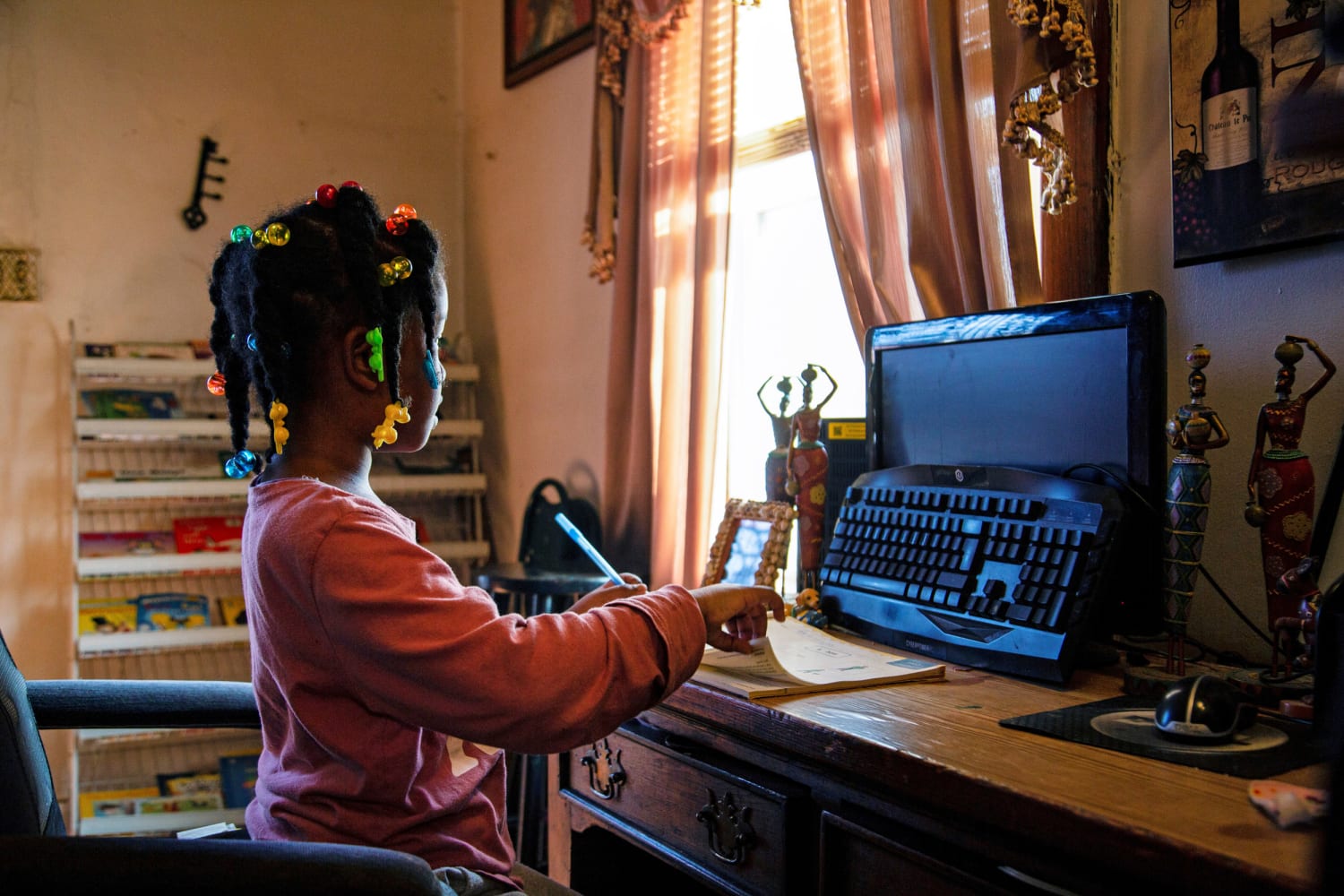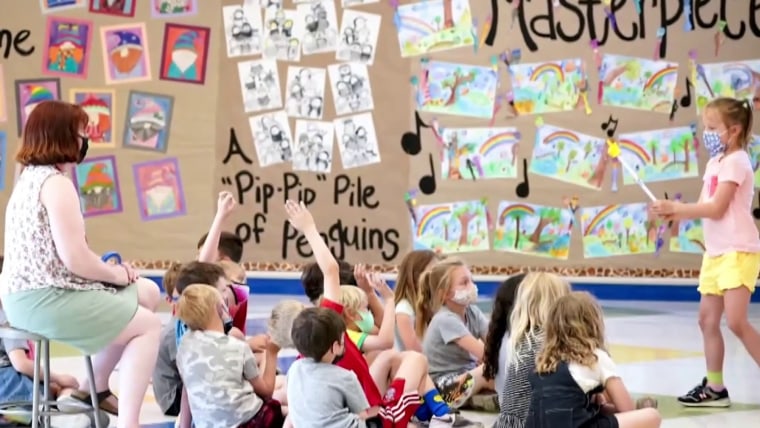Many of my worst pandemic fears about the fate of my cancer patients and adult family members abated once they became fully vaccinated. But with the hyper-transmissible delta variant circulating unchecked in many parts of our still half-vaccinated country, my unvaccinated 3-year-old son’s safety has never been so uncertain.
Research done in North Carolina, Wisconsin, Utah and Missouri has shown mask mandates effectively stymie coronavirus transmission rates in schools.
Up until now, kids have been spared the worst of Covid-19. Less than 2 percent of pediatric coronavirus infections have required hospitalization. Even of the 4,404 cases tallied to date of the dreaded multisystem inflammatory syndrome in children, a rare but serious condition linked to Covid in which different parts of the body become dangerously inflamed, less than 1 percent have died.
But this current phase of the pandemic is imperiling children, who are not authorized to receive the vaccine if under 12, at record levels. “It’s more than what we have seen in the past. Our ICU is 100 percent occupied,” said Dr. Sheldon Kaplan, a professor of pediatric infectious diseases at the Baylor College of Medicine in Houston. “No question there’s a huge impact in kids.”
Per the American Academy of Pediatrics, almost 100,000 new Covid infections were registered in children last week. Resulting hospitalizations have reached an all-time pandemic high. And hotspots like Florida, Missouri and Arkansas are also seeing severely ill kids filling up beds in the intensive care unit. Currently in Dallas, the situation has turned so dire that an official is warning that a sick child must wait for another to die before an ICU bed is available. There is also emerging evidence now that regardless of the severity of their initial infections, children, like adults, also grapple with a constellation of long Covid symptoms.
Yet several of these states are among those unconscionably rejecting the best and most-vetted method to mitigate the spread of this virulent disease to children, not to mention one that’s completely safe, easy to use and readily available: mask mandates. And it comes as kids are beginning to assemble in large numbers inside schools — the exact spots most conducive to rapid viral transmission.
Research done in North Carolina, Wisconsin, Utah and Missouri has shown mask mandates effectively stymie coronavirus transmission rates in schools. “Our study showed very little in-school spread, no real spread out to the community and no significant increase in the community numbers when there were really good mitigation measures. When we honed in on that further, really it was masks,” said Dr. Amy Falk, a community-based pediatrician in Wisconsin. “Masking-wearing is going to be pivotal.”
But universal masking for students has become a lightning rod issue, and mask mandates have become weaponized for our nation’s ongoing culture wars in places like Florida and Texas. These two states and six others, including Arizona, Iowa and South Carolina, have deemed mask mandates to be illegal, though many school districts are unhappy with the limitations and have pursued mandates anyway. In Florida, Ron DeSantis responded by threatening to slash the salaries of school leaders who require masking. In other places, the row over masks has led to physical assaults against teachers.
In places where mandatory student masking cannot be implemented, the penalty for these absurd political theatrics must be that in-school openings are suspended in favor of a return to remote learning. It’s the only way to shield otherwise defenseless children from the pernicious delta variant.
Already, many schools without mask requirements in Mississippi, Georgia and Indiana have been forced to return to virtual learning this past week after Covid outbreaks. In Mississippi alone, almost 1,000 kids tested positive for Covid during the second week of school after buildings opened their doors at the end of July. Another 440 students are quarantining in Palm Beach County, Florida, just a few days into the academic year after 51 students and faculty had confirmed cases of Covid.
A return to in-person school under such uncertain circumstances would be perilous at any time. It’s doubly worrisome at a moment when another contagious lung-related pediatric disease is also surging, as cases of respiratory syncytial virus are unseasonably surging across the country right now. At the same time, the overwhelming strain of the pediatric Covid load on hospitals also means that pediatricians and specialists are already struggling to attend to non-Covid health issues like trauma, appendicitis and acute asthma attacks.
Yet classrooms that impose mask mandates coupled with improved ventilation, accessible Covid testing, good hygiene, physical distancing and vaccinations for teachers and staff can allow schools elsewhere to stay open. This is crucial to not only preventing learning loss, but also preserving the long-term physical and mental health of children.
These efforts can be supported with the continued inoculation of eligible adults and adolescents, which has been shown to reduce Covid cases in unvaccinated kids. A 20-point rise in adult vaccination rates can halve the number of kids who test positive. Further inroads can be made to protect unvaccinated children by allowing their parents to continue working from home. And finally, the Food and Drug Administration should be pressured to urgently approve vaccines for those under the age of 12. A longer review period is superfluous, as it is unlikely that any vaccine side effects would appear after two months.
What has made children more resilient to Covid exposure than adults up until now is not entirely clear. Perhaps it’s because, compared to adults, childrenhave fewer receptors on the surface of their cells that the virus can use to enter and cause sickness. Kids might also be capable of deploying a more rapid immune response that snuffs out the contagion before it causes havoc. In addition, fewer comorbidities and lower obesity rates may also stave off severe outcomes.
But a lower risk is not an absence of risk. Simple pandemic math tells us that as legions of kids get infected, more will also be admitted to the hospital with serious symptoms. And it’s not yet clear whether the delta variant, which has already upended many of our pandemic assumptions, is making kids sicker than ever before or just increasing the volume of those who become exposed and subsequently ill.
Either way, places where state governments, school districts and parents refuse to provide basic health safeguards should automatically face virtual learning. Far more than just disrupting the normalcy of a third school year, any politicization or denial of medical and scientific truths threatens to morph this into a pandemic of the innocent.
Source: | This article originally belongs to Nbcnews.com











